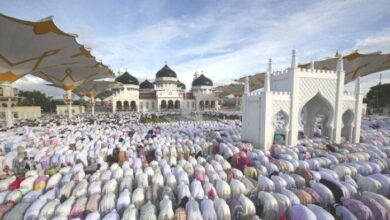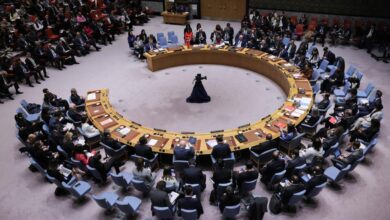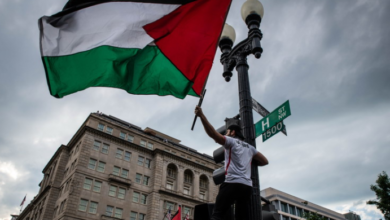The return of Grandson of Prabu Siliwangi

[Historical Short Story by Fatchuri Rosidin]
His name is Hidayatullah. Born in 1448. His blood is blue blood. Her mother was named Nyai Rara Santang, the second daughter of Prabu Siliwangi from Pajajaran. After a dream of meeting the Prophet, his mother left the palace and studied Islam with her brother, Raden Walang Sungsang in Cirebon. They studied from a scholar named Sheikh Nurjati. Since then, her mother changed her name to Mudaimah. After marriage, her name became Syarifah Mudaimah.
His father was also of the nobility. His name is Syarif Abdullah; a sultan of the Abbasid dynasty in Egypt. The text reaches the Prophet on the 22nd line so that the title of syarif is attached to the father. That is why in front of Hidayatullah's name the title syarif is written. Syarif Hidayatullah.
Great-grandfather from his father's line was named Jamaludin Akbar al-Husaini; son of Ahmad Syah Jalaluddin, the governor of Malabar, a province that is part of the Delhi Sultanate. The Sultanate of Delhi itself is led by his older brother: Amir Syah Jalaluddin.
Before he was 20 years old, Syarif Hidayatullah had memorized the entire contents of the Koran, thousands of hadiths, completed his education in Islam, history and government science at the world's best university at that time: Al-Azhar Egypt. To perfect his knowledge, he went to Mecca and studied for 2 years from the leading scholars there.
That day, at the age of 22, his mother advised him, “Ananda Hidayat, be grateful for the blessings of guidance that Allah has given us. That's the meaning of your name. And never forget your origins. The kingdom and people of Pajajaran have not been touched by preaching. Go back to Pajajaran and pray there. Invite your grandfather, Prabu Siliwangi, to feel the peace of Islam. "
This is not the first advice he has heard. But delivered again right after he finished his education, it seemed that the mother wanted to say that the time had come. Hidayat has been looking forward to this opportunity. In addition to the noble descent, in his blood also flows the spirit of preaching the scholars. His great grandfather, Syeikh Jamaludin al-Husaini left the Malabar palace in India and chose to become a cleric, traveling around the world spreading Islam in Kelantan, Champa, Samudera Pasai, Java and Sulawesi. He even let go of his eldest son, Maulana Malik Ibrahim, to go alone at a young age and preach in the Majapahit region.
"Mother, I have completed my education in Egypt and Mecca. God willing, I am ready to start preaching in the land of Pasundan, as my mother had said so far, "answered Hidayatullah.
Nyai Rara Santang smiled happily at her son's words. When leaving for Mecca with his brother, Raden Walang Sungsang, for Hajj and to gain knowledge following Sheikh Nurjati's advice, he prayed that he could return to Pasundan and invited his father, Prabu Siliwangi, to embrace Islam. Now that time has come. He will return with his son to preach to his father and the people of Pajajaran.
The historic day arrived. In 1470 Syarif Hidayatullah and his mother landed at the port of Muara Jati Cirebon. Cirebon was chosen because in that city Raden Walang Sungsang had become a great scholar and leader of the Cirebon government with the title Cakraningrat. Syarif Hidayatullah began his preaching while studying with Sheikh Nurjati in the Gunung Jati area. After Syeikh Nurjati and Syeikh Datuk Khafid, his younger brother, grew older and died, Syarif Hidayatullah led the Gunung Jati hermitage. He is known as Sunan Gunung Jati.
Syarif Hidayatullah's preaching quickly spread beyond Cirebon. Around 1475, Syarif Hidayatullah preached at Wahanten Pasisir, a port area which is now included in the Serang Banten area. His sympathetic preaching attracted the attention of Wahanten leaders who later converted to Islam and married his son to Syarif Hidayatullah. From this marriage, Maulana Hasanudin was born in 1478 who later became the first Sultan of Banten.
In 1479, Raden Walang Sungsang died. Syarif Hidayatullah returned to Cirebon and replaced Walang Sungsang as Sultan of Cirebon at the age of 31 years. In the same year, he was also appointed as the leader of Wali Songo. His knowledge, wisdom, and leadership led the wali to unanimously ask him to become a da'wah leader in Java.
Even though his preaching had spread widely, Syarif Hidayatullah was still restless. His grandfather, King Siliwangi, was not yet willing to convert to Islam. He poured out his anxiety on his mother.
"Prabu Siliwangi loved you very much and knew the glory of Islam that you preached to him. But worries about the shock that befell Pajajaran made him reluctant to take Islam. Do not give up. Pray that Allah will give guidance to your grandfather, ”comforted the mother soothingly.
In 1487 the Wali Songo meeting established Demak as the center of da'wah on the island of Java. This is also in line with the opinion of Sunan Ampel, the elder of the guardians. Demak's position is exactly between Majapahit and Pajajaran, making it easier for da'wah coordination in eastern and western Java. The guardians also founded the Demak sultanate. Raden Fatah, a young scholar who is also the son of the king of Brawijaya V of Majapahit and son-in-law of Sunan Ampel, has been named the sultan of Demak. Syarif Hidayatullah even stated that Cirebon was part of the Demak sultanate and broke away from Pajajaran.
Syarif Hidayatullah not only mastered the science of religion and government. He is also a military strategist. When the Portuguese attacked and controlled Malacca in 1511 and Pasai in 1512, the Sultan of Demak Raden Fatah asked Syarif Hidayatullah to form a joint force of Demak Cirebon to attack the Portuguese. Military expeditions were carried out twice, in 2 and 1513. Also when the Portuguese built a fort in Sunda Kelapa. Syarif Hidayatullah sent a joint fleet of Demak, Banten, and Cirebon, then appointed Fadhlullah Khan alias Fatahillah to drive the Portuguese out. On 1521 June 22 Demak succeeded in expelling the Portuguese from Sunda Kelapa. At that time, Islamic preaching was not only about worship, but also about economics, politics and the military.
Syarif Hidayatullah is blessed with a long life. In 1526 he made his son, Maulana Hasanudin, the first Sultan of Banten. Syarif Hidayatullah's da'wah has spread to almost all of West Java, except Bogor and its surroundings, which are the center of Pajajaran power. But the dukes of Pajajaran in the regions have converted to Islam. The peak occurred in 1568. Pajajaran fell into the hands of Syarif Hidayatullah. Forty aristocrats and elite Pajajaran troops who did not want to surrender then fled to the interior and became the forerunners of the present Baduy community.
In 1569, Syarif Hidayatullah died at the age of 120 and was buried in the hills of Mount Jati. He has completed his missionary mission in Sundanese land. This grandson of Prabu Siliwangi has changed the history of Pasundan from a Hindu-Buddhist society to an Islamic society. The history of the Hindu-Buddhist kingdom centered in Bogor changed to an Islamic kingdom with Cirebon, Demak, and Banten as its center.
The mother, Syarifah Mudaimah alias Nyai Rara Santang, can rest in peace. The struggle to leave the palace of Pajajaran, gain knowledge in the Arabian peninsula, and patiently educate his son has borne fruit: the birth of Islam in the land of Pasundan. Nyai Rara Santang is also grateful to have a mother who is strong with her Islam: Nyai Subang Larang. Prabu Siliwangi, who originally came to disband Syeikh Hasanudin hermitage, the teacher of Subang Larang, was fascinated by the reading al-Quran Forbidden Subang. He even made Subang Larang his consort. Subang Larang educated his three children in Islam in the middle of the Hindu-Buddhist culture of the Pajajaran palace.
O mothers of today, will anyone be born from your womb, the sons and daughters of Indonesia, who will continue the preaching of Syarif Hidayatullah and write the next history of Indonesia? Is there anyone as strong as Subang Larang who teaches his children with faith in a difficult environment? Is there anyone as persistent as Rara Santang who leaves the luxury of studying Islam as a provision to educate future children? [Source: www.fatchuri.com] [DDHK News]



